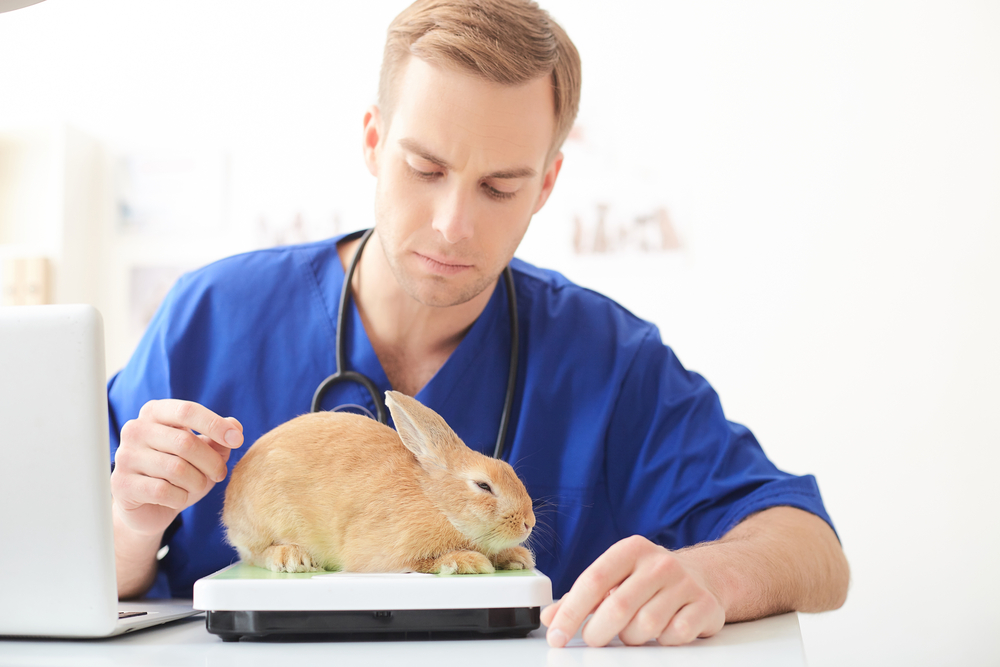Just like humans, rabbits are healthiest when they’re at an ideal weight — not too thin and not too fat. Monitoring your rabbit’s weight is something you can do at home, and it’s an excellent way to keep an eye on his overall health. Understanding the basics of rabbit weight management can help keep your bunny healthy and promote a long life span.
How much does a rabbit weigh?
There’s no one weight standard to measure your rabbit against. Rabbit weight can vary significantly by breed, with dwarf breeds weighing just a few pounds and giant breeds weighing significantly more. Instead of comparing your rabbit with the breed standard, it’s best to consider what weight your bunny is most healthy at. Your vet can help you determine this, and then you can use that weight as a baseline to monitor your rabbit’s health.

Weighing your rabbit
To weigh your rabbit, you’ll need an appropriate scale. Giant breeds are best weighed by standing on a scale with the rabbit in your arms, then deducting your weight from the measurement. Smaller breeds can be placed directly on a scale, as long as the scale is sensitive enough to register weights of just a few pounds. Postal scales can be a great option for this.
If you’re weighing your rabbit on his own, it’s best to place a towel on the scale and then zero out the scale. The towel can help keep your bunny from slipping and also cushions him from any cold or hard surface.
In addition to weighing your rabbit, you can monitor his body condition to determine whether he weighs too much, too little, or just enough.
Visual signs of weight issues
If your rabbit is overweight, you may notice a change in his body shape. His ribs and hip bones may be harder to feel, and you may notice rolls of fat around his tail, neck, tummy, and ankles. He may have a hard time moving around and become more sedentary than usual.
In contrast, a rabbit that’s too thin may develop depressions around his spine. You will be able to easily feel his ribs, hip bones, and spine, and he may lose both fat and muscle.
Being too fat or too thin is unhealthy for your rabbit and can shorten his life. You’ll need to take steps to get your bunny back to a healthy weight.
Helping your rabbit lose weight
If your rabbit is overweight, then you may need to change his diet. Rabbits can gain too much weight when they’re eating too many high-calorie foods. Try reducing the amount of dry food that you feed your rabbit and substitute in more hay and fresh leafy greens. You may also need to remove any hay pellets that you’ve been feeding him and provide plain, fresh hay instead.
Helping your rabbit gain weight
Rabbits most often lose weight because of a lack of appetite, which frequently is caused by some sort of disease. If your rabbit is too thin, see your vet first for a full evaluation.
You can support weight gain in your rabbit by feeding him a diet that’s primarily made up of grass hay. Make sure that he has consistent access to fresh water. You may also want to assess his environment. If he’s stressed, such as by young active children in the home, he may not be eating as much as he should. When you’re dealing with a rabbit that’s losing weight, it’s important to ensure that the root cause isn’t due to a physical issue, then start addressing other elements like diet and environment.
Seeking veterinary help
It’s always a good idea to seek a veterinarian’s help and advice about matters that concern your rabbit’s health and weight. Rabbits’ health can quickly take a turn for the worse, so if you’re concerned about your rabbit’s well-being, make an appointment with your vet. Your vet can also advise you about your rabbit’s body condition and give you management tips specific to your rabbit and his health.
By carefully monitoring rabbit weight, you can help prevent some serious health issues and keep your bunny healthy and happy. Keeping your rabbit at an ideal weight is a caring way to support his health and increase the chances of enjoying his companionship for years to come.
Want more bunny-related content? Check out our tips for choosing the best rabbit harness and leash.
Editors' Recommendations
- What fish can live with bettas? These are your best bets for fish buddies
- How long do guinea pigs live? Here’s what to know
- Best reptile pets: These are the 5 most affectionate reptiles you can welcome into your home
- Check these 3 things immediately if you have fish swimming at the top of the tank
- Best hamster bedding: The safest options for your furry friend



